


NRCSA Events
NRCSA Legislative Forum
February 20, 2025
Cornhusker Hotel in Lincoln
More about this event
NRCSA Spring Conference
March 20 & 21, 2025




NRCSA Legislative Forum
February 20, 2025
Cornhusker Hotel in Lincoln
More about this event
NRCSA Spring Conference
March 20 & 21, 2025
Crowne Plaza & Younes North Convention Center in Kearney
More about this event
NRCSA Golf Tournament
July 22, 2025
Meadowlark Hills Golf Course in Kearney
More about this event
NRCSA Executive Committee
November 20, 2024 9:00 AM CHI Center in Omaha, Room 206-207
NRCSA Scholarship & Recognition Committee
November 20, 2024, 10:00 AM CHI Center in Omaha, Room 208
NRCSA/UNO Closing the Achievement Gap Research Team
November 20, 2024, 11:00 AM CHI Center in Omaha, Room 206-207
NRCSA Legislative Committee
November 20, 2024, 1:00 PM CHI Center in Omaha, Room 206-207
NRCSA Rural Teacher Committee
November 20, 2024, 3:00 PM CHI Center in Omaha, Room 206-207



Please let Jack Moles know where superintendent vacancies occur, so that NRCSA Superintendent Search can make direct contact. We need to hear as soon as possible in anticipation of getting promotional materials specific to that board of education ready. It is critical that Board Presidents have the NRCSA contact information so that if they choose to consider a Superintendent Search Service, NRCSA is one they hopefully will consider.
Boyd County Schools
Application Process Complete
Finalists Selected: Nov. 13, 2024
Interviews: Nov. 18 & 19 or Nov. 23, 2024
Contract Begins: July 1, 2024
Lawrence-Nelson Public Schools
Announcement of Vacancy
Apply for this Vacancy
Application Deadline: Nov. 18, 2024
Finalists Selected: Nov. 25, 2024
Interviews: Dec. 4 & 5, 2024
Contract Begins: July 1, 2025
Access the Members area of www.nrcsa.net anytime.
Login: member Password: playground
NRCSA has moved to a new office. The new address for NRCSA is:
440 S 13th St, Suite B Lincoln, NE 68508
We are in the midst of the time in which we see movement of Superintendents. NRCSA has an outstanding Superintendent Search Service and I would encourage your Board of Education to closely consider these services if you are in need of a Superintendent.
In 2023-24, NRCSA assisted the Boards of Education at Sioux County Sioux County and Raymond Central in identifying their next Superintendent. We also assisted Deshler and Fairbury in identifying Interim Superintendents for next year. We are currently assisting the Boards of Education at LawrenceNelson and Boyd County in their Superintendent searches.
One of the more outstanding features of the NRCSA Superintendent Search Service is that the consultants who assist Boards of Education with their searches are all retired rural school Superintendents who experienced great success in their careers. They know what it takes to be successful in a rural school district and community, and how to work closely with a rural school Board of Education.
If your district finds a need to locate your next school leader, please be sure to keep the NRCSA Superintendent Search Service in mind. For more information you can contact Executive Director Jack Moles at jmoles@nrcsa.net or by phone at 402-335-7732.
Another service that is offered is a planning service. It is a common practice for Boards of Education and the Superintendent to develop short and long-term plans. We are currently assisting Anselmo-Merna in their planning process. NRCSA does provide a quality service using experienced consultants. If you are interested in more information, please contact Executive Director Jack Moles.
NRCSA Leadership
Dr. Heather Nebesniak, President. Ord Public Schools
Mark Lenihan, Past President. Wayne Community Schools
Chris Kuncl, Pres-Elect. Mullen Public Schools
Chris Prososki, Secretary. Southern School District # 1
District Representatives:
Eugene Hanks, West Crawford Public Schools
Dale Hafer, North Central Ainsworth Community Schools
Daryl Schrunk, Northeast Randolph Public Schools
Paul Sheffield, Southeast Exeter-Milligan Public Schools
Jon Davis, South Central Alma Public Schools
Jane Davis, Southwest Hershey Public Schools
Executive Director:
Jack Moles
Lobbyists:
Jon Edwards
Scott Moore
Russell Westerhold
Legislative Co- Chairs:
Dr. Jason Dolliver Pender Public Schools
Bryce Jorgenson
Southern Valley Schools
Scholarship & Recognition Co Chairs:
Tim Heckenlively, Falls City Public Schools
Jim Widdifield
Minden Public Schools
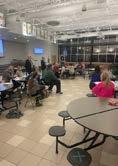

SYRACUSE-DUNBAR-AVOCA used the NRCSA Planning Service in 2022. NRCSA Consultants Rob Hanger and Fred Helmink assisted the district with its planning.
NRCSA Search Service Experience
NRCSA Planning Support Brochure
NRCSA’s annual membership drive is nearing its end. Notices were sent out in time for your July Board meetings, but members were welcome to pay their dues in the 2024-25 budget year. Annual Dues remain at $850. Last year we had 221 school districts, ESU’s, and State colleges and we expect to continue our annual growth. Thanks to you for being a member. This energizes our representation and advocacy for rural Nebraska, no matter who we are engaged with on education, legislation, or community issues. Without your support, there is less rural advocacy. Whether we like it or not, the outstate and rural population does not create a legislative majority anymore. In fact, rural Nebraska lost another seat in the Unicameral in the most recent redistricting. Finding success, whether passing, amending, or stopping legislation comes from membership, relationships, and focus. Thanks to your membership in NRCSA, rural is at the table and making a difference on behalf of our rural students, schools, and communities.
We do expect a growth in membership this year as we have already been informed that three Boards of Education have already voted to become new members for the 2024-25 school year. We are excited to welcome Osmond ESU 1, and Shelby-Rising City to NRCSA! We are very excited to have you as partners.
Nebraska was well represented at the National Rural Education Association’s “National Forum to Advance Rural Education” in Savannah, GA. Members of NRCSA’s Executive Committee, NRCSA’s administrative staff, and other Nebraska educators attended the conference on Oct. 31 and Nov. 1
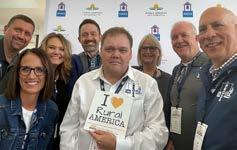
The NRCSA Executive Committee has made a positive move to assist non-traditional educators move toward full teaching certification. As a result of this move, new scholarship opportunities were created for paras who are in a “para to teacher program” and for transitional educators. NRCSA will provide three $1,000 scholarships for the fall semester and three $1,000 scholarships for the spring semester for the 2024-25 school year. Applicants for the scholarships must be current employees of a NRCSA-member district or ESU. Applicants must be enrolled for that semester in one of two types of programs: (1) in a recognized “para to teacher” program such as is offered by the three State Colleges (Chadron State, Peru State, or Wayne State), or (2) a transition to teaching program in which a person with a minimum of a bachelor’s degree who is employed to teach in a member school while working through a transitional program, such as offered by the University of Nebraska-Kearney. The applicant could currently be teaching under a transitional certificate. Application materials for Spring scholarships were distributed to member Superintendents and ESU Administrators, who were then asked to share with potential candidates in their buildings. Applications are due on December 2, 2024. The NRCSA Scholarship and Recognitions Committee will the three scholarship winners.
NRCSA Executive Director Jack Moles visited the districts of the three recipients Fall scholarships to make the scholarship presentations. The Fall recipients are: Kayla Christensen (Morrill), Lauren Nichols (Sioux County), and Tabitha Nelson (Falls City).
Kayla Christensen is currently a para at Morrill Elementary School. She has a Bachelors degree in Sports and Exercise Science and is working to obtain teaching certification in Early Childhood Education (Inclusive) through UNK.
Lauren Nichols is currently a Science teacher (provisional certificate) at Sioux County Public Schools. She has a Bachelors degree in Applied Sciences and is working to obtain a teaching certificate in Secondary Science through UNK.
Tabitha Nelson is currently a para with Falls City Public Schools. She is working on a teaching certificate in K-12 Special Education through Chadron State College.
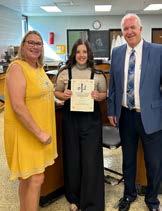
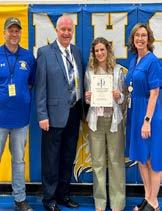
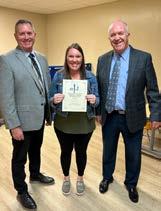
Nebraska voters turned out at historic levels Tuesday during the statewide General Election. Preliminary figures from Nebraska Secretary of State Bob Evnen indicate that 74 percent of all registered Nebraska voters participated in this year’s election, breaking the previous turnout record set in 2020.
All members of Nebraska’s incumbent Republican congressional delegation were reelected. Senator Deb Fischer fended off a tough challenge from Dan Osborn for another six year term, and Republican Congressman Don Bacon again narrowly won reelection to Nebraska’s Second Congressional District seat.
Nebraska voters approved ballot initiatives proposing a constitutional 12 week abortion ban (Initiative 434), paid sick leave (Initiative 436), and legalizing medical marijuana (Initiatives 437 and 438).
Nebraska voters also filled 25 of the Legislature’s 49 seats. From unofficial results, it appears that Republicans will hold 33 seats in the officially nonpartisan body, and that a total of 18 new senators will be sworn in when the Legislature reconvenes in January.
You can view our full report on elections to the Nebraska Legislature by clicking on the button below.
& Moore)
The Special Session of the Unicameral adjourned on August 20. The special session of the Nebraska Legislature was called by Governor Jim Pillen with the goal of reducing property tax levels. There were three days of bill introductions and a week’s worth of bill hearings.
LB 1, introduced by Sen. Linehan, contained the Governor’s plan for property tax relief. In part, this bill would have had the effect of the state taking over the funding of public schools. The plan had many issues from many different individual Senators and did not move forward. LB 9, introduced by Sen. Hughes, contained a plan that was more beneficial for NRCSA-member districts. This bill was taken over by the Revenue Committee as the vehicle to move the Governor’s plan forward. As amended, it also did not gain traction.
LB 34 ended up being the next vehicle by which the Unicameral’s Revenue Committee attempted to move forward with concepts in the Governor’s plan. After much debate, the amended LB 34 was again amended. In the end, property tax relief that was originally provided through income tax credits in LB 1107 from a few years ago will now be “front-loaded”. In the past these income tax credits for property taxes paid had to be claimed when property owners filed their income taxes. It is estimated that between 40% and 50% of property owners did not file for these credits. With LB 34, property owners will now automatically receive the reductions without having to file for them.
The cost of the new credit is $750 million in FY25, then increasing 3% every year after that. The state will reimburse school districts for the cost of the new credit. The bill also changes growth in property tax levy authority for cities and counties. LB 2 and 3, referred to the Appropriations Committee, change provisions relating to appropriations and funds to lapse unexpended funds from FY2023-24, reduce General Fund appropriations in the current fiscal year, to provide for transfers of cash funds to the General Fund, and to provide for the crediting of investment earnings from certain cash and revolving funds to the General Fund. LB 2 and LB 3 provide the additional funding for LB 34.
The 2024 regular session of the Unicameral ended in April. Below you will find a link to NRCSA’s summary of bills that were passed. A few bills that did not pass are also listed. Bills signed by Governor Pillen become effective three calendar months after adjournment (July 18, 2024), unless the bill has a specific operative date or was adopted with an emergency clause. Bills adopted with an emergency clause take effect the day after being signed. All bills not enacted at the conclusion of this year’s session are indefinitely postponed and will not carry over to the next Nebraska Legislature. They may, however, be re-introduced by a Senator as a new bill.
NRCSA has developed a “resource” document to assist members when they want insight on a particular topic. Often we are contacted and asked if we know of a school that has experience in a topic of interest. Many times we can point them in the right direction, but often we need to put out a request for information to the members. We have developed a list to begin from and already have some contact information on some of the topics. The plan is to feature this list in each of our monthly updates. Below is a link to a copy of this “early” list. If you would be willing to be listed as a resource or if you would like to suggest other topics for inclusion, please contact Jack Moles.
From NRCSA Executive Director Jack Moles: NRCSA is backing the work of the Nebraska State College System and the Nebraska SMART program. This is a unique approach to providing free tutoring services to your students. Information on the program is provided below. This program is beneficial on many levels. Among them are:
• The program is FREE for kids and families.
• The program provides valuable experience for prospective teachers.
• The program provides a paying job for prospective teachers.
• The program provides another great connection between Chadron State, Peru State, and Wayne State with NRCSA member school districts. All three of the State Colleges are NRCSA members.
• The program provides an opportunity to connect prospective teachers with rural schools. Some of the tutors did not attend rural high schools and this provides an opportunity for them to connect with rural.
• The program provides an opportunity to connect YOUR school with prospective teachers. You may be in the market to hire one of these tutors in the future and this connection could help!
Since the end of the Spring 2024 Semester, over 286 new students have registered, bringing the total to 429 students, 74% of whom attend NRCSA member school districts.

Our Tutors have been busy, conducting an average of 50-60 sessions each week. We have seen a steady increase
in both student registrations and tutoring sessions. Since the start of the current semester in September, 445 sessions have been completed, totaling 655 sessions since tutoring began in February. Our Tutors have spent over 237 hours this semester helping students across rural Nebraska. Below is a breakdown of tutoring sessions completed by subject and grade level.
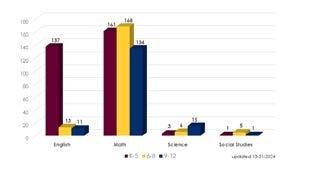
Thank you for your efforts to raise awareness and promote this valuable program!
To access tutoring, parents need to register their student(s) through our website. After registering, parents and students can log in to schedule tutoring appointments or request on-demand tutoring with a Tutor. Students are encouraged to provide the homework or assignment for which they need help. Assignments can be uploaded to the secure classroom, sent to the Tutor in advance via message, or a picture can be taken of the assignment when connected to the Tutor in the classroom.
Tutoring for the Fall 2024 Semester is available Monday through Thursday, from 3:30 to 7:30 PM local time.
No Tutoring November 26-28
Tutoring will not be available from Tuesday, November 26 through Thursday, November 28, due to the State Colleges’ Fall Break.
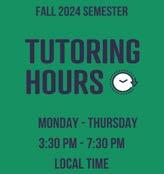
Parents and students can schedule tutoring appointments with a Nebraska SMART Tutor by logging in to their accounts through the website. Students should provide homework for which they wish to receive help. Assignments can be uploaded to the secure classroom, can be messaged to the Tutor in advance, or a picture can be taken of the assignment when connected to the Tutor.
How can school districts help?
Your assistance in communicating with parents in your school district is essential to expand awareness and generate interest in this program. Below are ways that you can help:
Share about Nebraska SMART
• In school/district/classroom parent newsletters
• During Parent/Teacher Conferences
• With Teachers, Counselors, Parent/Teacher Associations, and district staff
• Link Nebraska SMART as a student resource on school district websites
• Distribute bookmarks to each K-12 student in school/district
• Connect with Nebraska SMART on social media: Facebook, Instagram, and X (Twitter)
• Share with district technology team the domain allowlist guide For more information, visit: www.nscs.edu/nebraskasmart
Questions, comments, or concerns? Email: nebraskasmart@nscs.edu
School districts can request additional promotional supplies by emailing nebraskasmart@nscs.edu.
Thank you for your support in broadening awareness of Nebraska SMART within your school districts! We look forward to serving your students.
Julie Dickerson, Nebraska SMART Director nebraskasmart@nscs.edu
From Rebecca Vogt, UNL
Today we are releasing the first of the reports from the 2024 Rural Poll, focusing on the well-being of rural Nebraskans. The report can be accessed online. The press release for this report can be found here.
Well Being of Rural Nebraskans
From Jay Martin, NDE Director of School Safety & Security
It is time for a new school year, and I hope you all found time this summer to do something fun and/or relaxing! Below you will find the School Safety Newsletter – Fall Edition. In the first five pages is the quarterly school safety updates and trainings. The Badge Certification is underway, and we already have several schools who will be getting their Diamond Badges to show their communities the challenging work they are doing to keep students, staff, and visitors safe and secure. Make sure to sign-in and get your badge today!
Due to many requests the Digital Parent Academy is now available on our YouTube Channel. Also, there is a Promo video for parents that can go up on schools Digital Billboards to direct parents to view the 4-part series on being digitally wise with their children. Thanks to those of you who suggested the billboard.
Once you have read the School Safety Newsletter there is seven different flyers with trainings that are available this fall. Please use the links to get your staff signed up for these opportunities to aid in keeping others safe.
Lastly, please join us in Kearney on October 17th YCC, South from 8:30 to 4:30 for the School Safety Summit. Anyone from our schools is welcome to attend including the first responders in your communities. School Safety is not just for specific people it is for everyone, and we will have a great keynote Lisa Hamp, Virginia Tech survivor, several breakouts, and a panel discussion on two emergency situations. Registration will be coming soon this month or the first part of September.
School Safety Newsletter - Fall 2024
Developing business & Industry, organizational, and postsecondary partnerships with school districts can play a pivotal role in enriching the educational experience, supporting student achievement, and strengthening connections between schools and their communities. By leveraging external resources, expertise, and support, schools can create a more inclusive, engaging, and supportive learning environment for all students. While partnerships within school districts can bring numerous benefits, there are also challenges that may be encountered. These can be overcome by fostering a culture of collaboration, prioritizing communication and relationship-building, seeking creative funding solutions, and promoting equity and inclusivity in partnership efforts. Additionally, leveraging support from district leadership, community stakeholders, and external resources can help schools overcome obstacles and maximize the benefits of collaborative partnerships.
We in the Institute of Agriculture and National Resources (IANR), specifically the College of Agricultural Sciences & Natural Resources (CASNR) and Nebraska Extension 4-H, believe this strategy for K-12 partnerships will result in a strong learning innovation network of support for every learner and every educator in the state of Nebraska. The world of higher education is evolving, driven by changes in technology, demographics, workforce demands, and societal expectations. To meet the needs of today’s learners in the 21st century and prepare them for the challenges of tomorrow, we are embracing innovation, collaboration, and a student-centered approach.
In recent years, CASNR has created two new positions to help in this work. Dr. Tammy Mittelstet (tmittelstet@ unl.edu) is serving as the CASNR Statewide Education and Career Pathways Coordinator and Bailey Feit (bailey.feit@unl.edu) serves as the LPS/CASNR Early College and Career Pathways Coordinator. They engage in co-creating education and career pathways for students and supporting teachers by:
• creating opportunities and minimizing barriers for all learners in the exploration of education and career pathways,
• investing in and supporting teachers to innovate and integrate cross-curricular concepts of Food, Energy, Water, and Societal Systems (FEWSS) throughout K-12 education,
• encouraging our higher education institutions to share content expertise to build curriculum that will inform best practices in the areas of FEWSS and mentor future systems thinkers for the continuum of learners through our higher education institutions,
• connecting and developing a team of community leaders to build partnerships that combine resources to support student and teacher innovation, and
• building a workforce of tomorrow with the support of the industry of today by developing work-based learning opportunities.
If you would like to get monthly updates, consider signing up for the L.I.N.K.S. newsletter at https://casnr. unl.edu/k-12-partners.
Nebraska Extension brings University of Nebraska expertise and research in 8 key areas of impact directly to Nebraskans from all walks of life in each of the state’s 93 counties. Nebraskans turn to Nebraska Extension to strengthen their families, inspire their communities, empower young people, conserve and protect natural resources and advance their farms, ranches and businesses. Nebraska 4-H represents one of the eight key areas, and has been a leader in the career and college readiness field by being one of the first in the country to support a statewide educator position and team to provide leadership in program development and delivery.
The College & Career Success Team is led by Dr. Dawn Lindsley (dawn.lindsley@unl.edu) at the State 4-H Office and Jacie Milius (jacie.milius@unl.edu) in Gage County. In 4-H, we believe in the
power of young people. With nearly six million members nationwide and 140,000 in Nebraska, we empower youth to lead for a lifetime. In a rapidly changing world, it’s crucial for young people to be equipped with the right mix of knowledge, skills, and experiences for their transition from education to the workforce. Through our programming, we provide developmentally appropriate, experiential learning opportunities to help youth and adults explore postsecondary education and career options, preparing them to reach their fullest potential in today’s dynamic job market. If you would like to learn more, please visit https://4h.unl.edu/programspriorities-career-college-success.
Nebraska students are the leaders, innovators, and problem-solvers of tomorrow. Through collaboration with business & industry, organizational, and postsecondary partners, school districts can provide students with invaluable real-world experiences, access to resources, and insights into the demands of the workforce. We can bridge the gap between education and employment, equipping students with the skills, knowledge, and connections they need to thrive in the competitive global economy. Together, we can create a brighter future for our students and our communities.
NRCSA has had the great privilege to work closely with Open Sky Policy Institute over the years. They provide great information on the fiscal impact of legislation that is very helpful to me in my work as NRCSA’s chief lobbyist. I would encourage Superintendents and Board of Education members to sign up to receive Open Sky’s email updates.
Open Sky has developed some awesome Nebraska Public School District Profiles instruments. It provides much information that can be used to tell the story of your district in comparison to other districts when discussing school finance. The instruments can be accessed at:
https://www.openskypolicy.org/schooldistrictprofiles
The mission of OpenSky Policy Institute is to provide impartial and precise research, analysis, education and leadership on fiscal policy-improving opportunities for all Nebraskans. Subscribe to their email updates at https://bit.ly/OpenSkyUpdates https://bit.ly/OpenSkyUpdates or contact Todd Henrichs at thenrichs@ openskypolicy.org.
At the Membership Meeting during the Spring Conference the Executive Committee presented updated NRCSA Constitution/By-Laws for approval by the membership. According to NRCSA rules, such issues must be shared with the membership prior to the meeting. The updates were approved. Below are links to a working copy with suggested revisions and an adopted copy which was voted on and approved.
Adopted copy
The National Rural Education Association, in partnership with the Rural Schools Collaborative, has issued a study entitled WHY RURAL MATTERS. The report “looks critically at how educational supports and resources for student well-being are being distributed, casting light on which of our rural children are in need of additional support”. The study is well done and shows Nebraska in a pretty positive light. I would encourage you to take a look at WHY RURAL MATTERS, which can be accessed here:
The National Rural Education Advocacy Coalition (NREAC) partnered with AASA in producing a report on REAP. REAP is a program that benefits many of our smaller districts. The report can be accessed here:
https://www.aasa.org/docs/default-source/resources/reports/rural-education-achievementprogram-survey-report.pdf
NRCSA is pleased to announce a partnership with New Leaf Teletherapy. New Leaf provides mental health teletherapy services for both staff and students. I became very interested in this possibility especially in terms of staff services. I know our members are working hard to provide services for their students, but there does not appear to be that same capability when looking at staff services.
I look at this service as helping to bolster what your district is already doing, not to take the place of those efforts. I believe this can be a cost effective means of furthering your efforts.
NRCSA recently hosted three introductory Zoom meetings with Mark Goldman and Deb Romano of New Leaf to have them explain what the program would look like. Below you can access the slide show from those meetings, as well as a recording of one of the meetings.
New Leaf PowerPoint Presentation
New Leaf Zoom Meeting (recording)

If you would like to be in contact with Mark Goldman or Deb Romano, please feel free to call or email me and I can help make that happen.

Read the Full Blog
Board of Education meeting visits. Beginning in December, 2019, I started attending Board of Education meetings in member school districts/ESUs. Since then, I have attended 113 such meetings. I most recently attended the Board meetings at Fullerton and St. Edward on Monday, October 14.
I am scheduled to attend the following Board of Education meetings in the near future:
MONDAY, NOV. 11: Stuart and West Holt
TUESDAY, NOV. 12: ESU 17
WEDNESDAY, NOV. 13: Valentine
I have really enjoyed attending meetings and am willing to attend Board meetings when I can. I take a few minutes to cover NRCSA news and offerings, as well as a legislative update. When I am going to be in a specific area on Board meeting days I may send out a notice to near-by Superintendents to make an offer to visit. I’d like to be able to schedule two or three in the same evening if I can.
If you would be interested in me attending a future Board meeting, please contact me to start the arrangements. I would also be willing to “attend” your Board meetings via Zoom if you preferred. I would still only do one at a time but would be able to do several in the same evening. Let me know and we will try to make the connection.
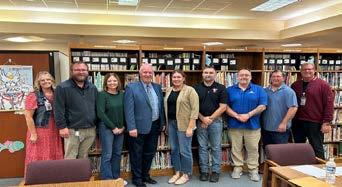
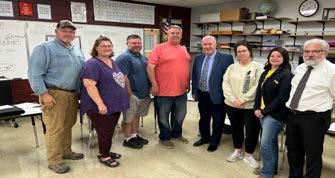
The American Heart Association is committed to partnering with schools in rural Nebraska to improve the health of their communities. A few of these opportunities include:
Tobacco Free Schools. Unfortunately, recent data reveals the ongoing challenges of youth tobacco use. The 2021 National Youth Tobacco Survey showed that: Approximately 2 million MS/HS students reported using e-cigarettes during the pandemic; nearly 85% of them used flavored tobacco products. More than 4 in 10 HS students and nearly 2 in 10 MS students who used e-cigarettes did so 2 out of 3 days and youth showed a strong brand preference.
Many schools have struggled to keep up with the continued innovation of the tobacco industry. To help address that, the American Heart Association created our Tobacco Free Schools Toolkit. The toolkit is designed to help schools update their policies so that now – and in the future – they will cover all products, people, and places while providing mechanisms that support students who are battling tobacco addiction. More information/ resources are here.
Improving Cardiac Response in Schools. Did you know that the odds of surviving a cardiac arrest in rural areas is only about half of that in an urban area? In the aftermath of a cardiac emergency - minutes matter. The Chain of Survival starts with those who are present and requires everyone to do their part. The American Heart Association is committed to building a Nation of Lifesavers to and to helping school districts and other entities develop Cardiac Emergency Response Plans. These plans consider: access to functioning AED’s, a strong base of CPR knowledge and training, as well as the identification of a response team and the annual practice of
a cardiac emergency. Tim Nikolai, Sr. Rural Health Director at the American Heart Association can help. Please reach out to: Tim.Nikolai@heart.org.
Learn CPR in 60 Seconds
A note from Mr. Nikolai:
For those I have not met previously, I am the American Heart Association’s lead for rural health in the Midwest Region, inclusive of your states. My role allows me to work collaboratively with all manner of organizations that are in a position to impact health in their communities – and schools are certainly near the top of that list.
There are many ways our organization has worked to collaborate with schools – supporting access to nutritious, affordable food, helping to address the ongoing challenges of vaping/tobacco use, and more. Today, though I’m focusing primarily on our resources to assist with cardiac readiness / cardiac emergency response planning.
Much of the country was watching – or has followed since – the collapse of Buffalo Bills’ safety, Damar Hamlin, on Monday Night Football. Fortunately, Damar’s story had a happy ending. Our goal is to maximize the opportunity for everyone to have a similar outcome should they experience a Sudden Cardiac Arrest. Most organizations will not have the resources that the NFL does to ensure player safety, but there is much that can be done, especially with proper planning.
Some data suggests that nearly 1% of schools will be the site for an out of hospital cardiac arrest annually. For a variety of reasons, rural areas are disproportionately impacted by both rates of cardiac arrest and poor outcomes. We know that prepared and equipped schools mean better outcomes for staff, students, visitors, and the communities that so often gather in school spaces.
We have recently built out/updated a variety of tools to assist schools – and other organizations – with their cardiac readiness. These include:
• Sample Cardiac Emergency Response Guidelines and Plans.
• A toolkit to maximize the impact of AED placement and implementation.
• Training and awareness tools to help with Hands-Only CPR knowledge for staff and students.
• A revamped, training site search feature, for coaches, nurses, and others who need CPR certification.
• In some cases, we may have – or be able to help secure – financial resources to help schools with purchasing/ maintaining AEDs, CPR mannequins, etc. Hearing the scope of that need can help us secure additional resources, so please let us know!
Please let me know if you see an opportunity or need to dialogue about these resources further or share them with your member districts. I’m happy to assist with newsletter copy, join or host webinars, or other ideas that fit your standard means of communication.
Finally, at the risk of sharing too much – a few other notes I wanted to highlight.
• I’ve attached an invitation for our Fall Educator Series. Administrators/Educators from all districts are welcome to attend the sessions they are interested in. You’ll see the one in November is on Cardiac Emergency Response Planning.
• Last year some 1300+ rural schools in the Midwest participated in our Kids Heart Challenge program. They raised life-saving money for our mission, earned PE equipment for their schools, and helped improve health knowledge in their community. Last year, tens of thousands of families learned Hands-Only CPR through the program.
• Thanks to the Missouri Rural Health Association for sharing our HeartCorps program on their home page. That opportunity exists for IA, KS, KY, MN, MO, NE, OH, and WI. Happy to chat more!
The Nebraska Department of Education, Center for Rural Affairs, Nebraska Extension, Buy Fresh Buy Local, and No More Empty Pots are pleased to announce the establishment of the Farm to School Network in Nebraska. The network aims to increase access to fresh and nutritious foods in Nebraska schools and strengthen connections between local farmers, educators, and communities.
To build this network, a Network Development Committee and Advisory Committee will lead the process and guide stakeholders to create a strategic, collective action plan that will move farm to school forward in Nebraska. The Network Committees are made up of representatives from key organizations and institutions across the state and are focused on breaking down barriers standing in the way of implementing farm to school initiatives.
The Network Committees will begin the network building process with mapping community assets, phase one of the Nebraska Farm to School Network Timeline. Through this phase, they will collect information on existing farm to school activities in the state and establish a vision for the network.
All stakeholders interested in building a stronger and healthier food system in Nebraska may participate in upcoming virtual and in-person listening sessions. These listening sessions will take place from October 10th to 18th and provide a platform for sharing information about current farm to school activities and discussing the future vision for the network.
“Pillars to farm to school success in a state include partnerships, policies, and supportive programming. A network will support development of these initiatives,” said Sarah Smith, Nebraska Department of Education Farm to School Specialist and Project Director.
To register for the listening sessions or to learn more about the Nebraska Farm to School Network, please visit the Network’s webpage.
Southern Superintendent Chris Prososki has shared a sample Superintendent Checklist that he uses. I thought this was a great instrument, one that I wished I had available to me when I was in the Superintendency. It can be especially helpful as you head into the new school year! Thanks to Chris for sharing this! You can access the updated checklist here:
The ESUCC and ESU 3 have shared a document which outlines all of the trainings and mandates that are required of districts. The document, “School District Plans, Policies, and Annual Trainings Requirements”, is a handy reminder for districts. Thanks to ESUCC Executive Director Kraig Lofquist and ESU 3 Administrator Dan Schnoes for developing and distributing this handy tool. The document may be accessed here:
School District Plans, Policies, & Annual Trainings
We urge you to consider participation in the NRCSA Partner OneCard program as a tool for you in managing school expenditures, both large and small. Certainly, the card can help reduce/eliminate any issues relative to unverified cash expenditures. You decide who uses it, can get cards for each of those users, keep all cards wherever you wish, determine the amount to load on each individual card, and how long the time frame of use is. It is a terrific management tool and clearly identifies each expenditure/name/date/amount. Whether small purchases or very large purchases, the card is a terrific tool. NRCSA owns the state contract, so liability for misuse falls to NRCSA, not the district user. We have only had three circumstances of fraud and all three have been the theft of the card number information, not any district employee misuse. For 2023-24, 98 districts/ESUs participated in the program. We have received interest from several districts already this year, so we believe we will end up with over 100 entities using the program. Great job by all participating districts in protecting the card and program! Don’t forget, the NRCSA rebate from the transaction fee paid by businesses that choose to accept plastic is used for scholarship, awards, and special needs. For 2023-24, the rebate was over $30,000 to NRCSA, showing that use is increasing, and large purchases are being included. WIN, WIN, WIN! If you are considering joining the program and need more information, please contact Jack Moles (jmoles@nrcsa.net) or Jeff Bundy (jbundy@nrcsa.net).



The NCA & Proactive Coaching partner to bring Coach Bruce Brown’s legendary insights about the parent’s role in education-based athletics to your school & community.
Book your School’s Presentation

Parent Meetings or Special Events
PRESENTED BY DARIN BOYSEN, NCA EXECUTIVE DIRECTOR
“Outstanding information, well delivered. There were times I thought he was talking directly to me, which is a sign of a great communicator. I personally feel I’m better today than yesterday as a sports parent because I was able to listen to this message.” – Parent & School Board Member
What do Athletes/Kids Really Want?
Releasing Your Son/Daughter to the Experience
Parental Red Flags
During the Game/Event
Modeling Appropriate Behavior
Big Picture
One Instructional Voice
NEBRASKA COACHES ASSOCIATION
500 Charleston St, Ste 2, Lincoln, Nebraska 68508 402-310-5472 | darin@ncacoach.org


After the Game/Event
Time & Space
Confidence Building
Relationship Building
Six Powerful Words


The Nebraska Coaches Association (NCA) is excited to announce a partnership with Proactive Coaching to bring Coach Bruce Brown’s legendary insights about “The Role of Parents in Education-Based Athletics” to your school and community. Please see the attached flyer for highlights/focus of the in-person presentation.
NCA Executive Director, Darin Boysen, will begin travel across Nebraska multiple times throughout the 20242025 school year to deliver this powerful and passionate message. The NCA, Proactive Coaching and Darin are partnering to bring this message to your school at a 50% discounted rate from the standard Proactive Coaching in-person booking fee.
Presentation Details:
45-Minute Parent Presentation with One School or Combined Schools
• Single school presentations are recommended but not required
• One presentation = one fee (no additional fee for schools merging)
Audio/Visual Requirements from the Host School:
• Overhead Projector with HDMI Connection
• Screen or Scoreboard Display
• Microphone
Cost – Payable the Day of Presentation:
• Within 75 miles of Lincoln/150 miles Round Trip
• $750 flat rate
• Beyond 75 miles of Lincoln/150 miles Round Trip
• $750 flat rate
• 50 Cents per mile Round-Trip -OR- Cost of a Rental Vehicle/Gas
• In some cases, a rental car may be cheaper for longer distances
• Hotel Expense – if needed
• Please Note: Working together with other area schools to book separately on consecutive days of the week can greatly save travel and lodging expenses
The following booklets authored by Bruce Brown will be available for purchase for $5 each (15% discount) after the presentation or ordered by the school in advance:
• The Role of Parents in Athletics
• Playing with Confidence
• Life Lessons for Athletes
Please let us know if you have any questions regarding the presentation or booking a date. All the best,

Darin Boysen
Nebraska Coaches Association


NRCSA wishes to share in the celebration of the special accomplishments and recognitions going on in our member schools and ESUs.
November 2024:
* The Nebraska Art Teachers Association recently announced its 2024 award winners. Teachers from NRCSAmember districts who were recognized include:
• Kylie Kubicka of Kenesaw–NATA Outstanding Art Educator of the Year and NATA K-12 Art Educator of the Year
• Mike Trotter of Schuyler–NATA Secondary Art Educator of the Year.
• Carissa Hill of Southwest–NATA Francis Thurber Preservice Educator of the Year.
* Tiffany Heins of David City Public Schools was a finalist for the National Rural Education Association’s “Rural Teacher of the Year Award”. She was NRCSA’s nomination for the award.
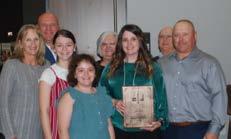
* Kara Suchsland of Minden was the Class C Individual State Champion in Girls Golf.

* Wayne won the Class C State Championship in Girls Golf. Minden finished as the runner-up.
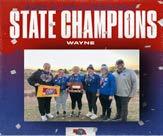
* DC West finished as the Class C Runner-up in Girls Softball.
* Cross Country teams from NRCSA-member schools had strong State Meets.
• Holdrege was the Class C State Champion in Boys Cross Country.
• Auburn was the Class C State Champion in Girls Cross Country.
• Perkins County was the Class D Boys State Champion.
• McCool Junction was the Class D Girls State Champion and Sandy Creek was the Class D Girls Runner-up.
• Hailey O’Daniel of Arlington was the Class C Girls Individual Champion.
• Mason McGreer of Perkins County was the Class D Boys Individual Champion.
• Kayleigh Betka of McCool Junction was the Class D Girls Individual Champion.
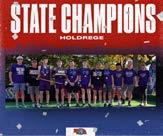
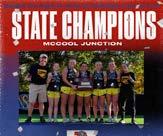
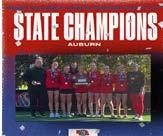

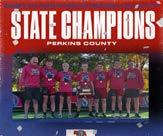
* Hailee and Hannah Greiner (freshmen twin sisters) of Johnson-Brock placed first in the Plant Systems Division of the Agriscience Fair at the FFA National Conference. Their project was the study of Color of Light vs Plant Growth.
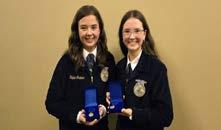
* Palmyra was the Class 1A State Champion in the Nebraska State Bandmasters State Marching Band Competition.
* Currency and the Nebraska School Activities Association (NSAA) announced the 2024-25 Believers & Achievers honorees. Believers & Achievers is a statewide program designed to give recognition to Nebraska’s future leaders. Students at NRCSA-member schools include: Evan Frink (Adams Central), Emma Kennedy (Ainsworth), Miley Whitney (Alma), Ava McFarland (Bloomfield), Aidyn Bonifas (Blue Hill), Brooklyn Eckert (Boyd County), Kit Brooks (Central City), Jorja Yocom (Cozad), Ava Cramer (Cross County), Addyson Hintz (Deshler), Taylor Burge (Gothenburg), Gavin Bell (Hemingford), Mattie Kamery (Minden), Cecilia Barron (Morrill), Peyton Paxton (Mullen), Ashley Sidak (O’Neill), Madison Enstrom (Oakland-Craig), Parker Walahoski (Overton), Skylar Scholting (Pierce), Jolie Dix (Plattsmouth), Allison Vavricek (Schuyler), Lane Lund (Twin River), Gavin Redden (Wayne), Cash Keslar (Wilber-Clatonia), Cara Bunger (Wilcox-Hildreth), and Eliza Lange (Wynot).
* The Nebraska Coaches Association and Custom Sports announced the 2024 Super State and Class All State teams for Girls Golf and Boys and Girls Cross Country. Athletes from NRCSA-member districts who were recognized included:
• GIRLS GOLF SUPER STATE: Mia Hiebner (Heartland), KayLynn Jorgensen (Minden), and Kara Suchsland (Minden).
• GIRLS GOLF CLASS C ALL STATE: Joslyn Johnson (Wayne)
• BOYS CROSS COUNTRY SUPER STATE: Trevor Zurn (Alliance), Mason McGreer (Perkins County), Elijah Goodell (Perkins County)
• BOYS CROSS COUNTRY CLASS C ALL STATE: Avery Carter (Milford), Tyler Hetz (Gothenburg), Haven Hauxwell (Chase County), Dayton Graves (Syracuse), Kolby Tighe (Arlington)
• BOYS CROSS COUNTRY CLASS D ALL STATE: Kaser Johnson (Doniphan-Trumbull), Jobjosiah Muthiani (Freeman)
• GIRLS CROSS COUNTRY SUPER STATE: Mallory Robbins (Plattsmouth), Hailey O’Daniel (Arlington), Kayleigh Betka (McCool Junction)
• GIRLS CROSS COUNTRY CLASS C ALL STATE: Brenna Benjamin (Holdrege), Scout Bell (Gothenburg), Liston Crotty (Auburn), Olivia Crotty (Auburn), Autumn Gasper (Boone Central)
• GIRLS CROSS COUNTRY CLASS D ALL STATE: Sage Holtmeier (Tri County) Angela Frick (North Central), Ashley Robertson (Wallace), Madison Shaw (Sandy Creek), Mazzy Kuchar (Elkhorn Valley), Ava Brennan (Ponca)
* Laura Barrett, Administrator at ESU 13, was honored by the University of Nebraska-Lincoln with the Educational Administration Impact Award.

* Many students from NRCSA-member districts were selected to Nebraska All State music ensembles. Included were:
• ALL STATE BAND: Landon Hergert (Plainview), Claire Vincent (Gothenburg), Elsie Gilliland (Randolph), Connor Holmstedt (Fort Calhoun), Gunner Lippold (Falls City), Lizzy Walton (Northwest), Aubrie Zimmerman (Pierce), Michael Tophof (Ogallala), Jorja Pohlmeier (Aurora), James Adle (Chase County), Aiden Bohnert (Wayne), Payton Ebmeier (Pierce), Lylla Sabata (Fullerton), Benjamin Johnson (Creighton), Katie Abbott (Hershey), Timothy Richey (Alliance), Alex Schuler (Fort Calhoun), Tyler Koeneke (Auburn), Sutton LaBrie (McCook), Michael Maxon (Fort Calhoun), Calvin Miller (Aurora)
• ALL STATE CHORUS: Hadleigh Collison (Pierce), Amara Funk (Gordon-Rushville), Anna Guthner (Plattsmouth), Addie Hayman (Northwest), Sydney Hochstein (Bloomfield), Kristin Holcomb (Arapahoe), KristyAna Linder (Ord), Madyson Miller (Northwest), Delilah Qualset (Elkhorn Valley), Morgan Stevens (Crofton), Norah Armstrong (Wayne), Nix Johnson (Wisner-Pilger), Chelsea Kment (Stanton), Mallory Mackin (Blue Hill), Alicia Mueller (Lakeview), Shirley Cotant (Mitchell), Olivia Hanson (Wayne), Cadence Lambert (Chase County), Willing LilyAnn (Tekamah-Herman), Emilee Olson (Randolph), Marissa Sahagun (Bloomfield), Ava Thornton (Plattsmouth), Erin Wagner (Osmond), Miley Whitney (Alma), Adrienne Anderson (Wayne), Jordyn Clinchard (Wayne), Joslyn Hochstein (Wynot), Sienna Klinetobe (Wayne), Clara Ladman (Malcolm), Lillian Lang (Arlington), Hannah Strizek (East Butler), Will Bergsten (DC West), Landen Claussen (Wayne), Braydon Hoesing (Wausa), Henry Holtmeier (Tri County), Grayson Kester (DC West), Michael Ney (Ponca), Ethan Rosenthal (Tri County), Jax Tighe (Arlington), Kolby Tighe (Arlington), Peyton Conroy (Pender), Jacob Cover (Weeping Water), Austin Fletcher (DC West), Cole Huffman (Maxwell), Bradley Lentz (Ponca), McKinnley Mogus (Wakefield), Quinnlan Mosher (Crofton), Aaron Panning (WilberClatonia), Micah Panning (Wilber-Clatonia), Lael Rathbun (Arapahoe), Ashten Schwarz (Northwest), Beau Weiss (Chase County), Gavin Anderson (Wayne), Gabriel Armstrong (Wayne), Blake Hochstein (Bloomfield), Clayton Coe (Arlington), Michael Dodge (Bloomfield), Braeden Guenther (Bloomfield), Tyler Kirk (Northwest), Zach Miller (Heartland), Brock Paul (Tekamah-Herman), Colby Raulston (Wayne), Matthew Rosenlund (Northwest), Grant Schieffer (Crofton), Benjamin Dodge (Bloomfield), Julian Duplessis (Northwest), Talon Gilfert (Weeping Water), Kaden Haverkamp (Bloomfield), Braden Janzen (Heartland), Ezekiel Larsen (DC West), Rafa Magnino (Arlington), Riley Morgan (Northwest), Revin Nyberg (Cross County), Kevin Salcido (Wilber-Clatonia), Jack Schieffer (Crofton), Caden Sheffield (Northwest)
• ALL STATE JAZZ BAND: Spencer Sindt (Pierce)
• ALL STATE ORCHESTRA: Ceilus Ibarra (Wayne), Omar Barrios (Schuyler), Ella Schlake (Ogallala), Riley Best (Alliance)
The National Rural Education Association’s Legislative Committee (of which NRCSA is a member) continues to represent rural education on the Federal level. NRCSA Executive Director Jack Moles and NRCSA Legislative Committee Co-Chair Bryce Jorgenson (Supt. at Southern Valley) attended the NREA Federal Legislative Summit in Washington DC on April 28-30.
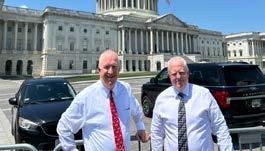
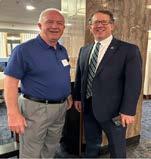
NRCSA EXECUTIVE DIRECTOR JACK MOLES AND NEBRASKA CONGRESSMAN ADRIAN SMITH
Bryce and Jack met with the offices of each of Nebraska’s contingency in Congress. They specifically shared three points of emphasis with them:
• Copies of NREA’s publication, “Why Rural Matters” was presented to each of the offices.
• Full funding of IDEA was stressed. This would bring about $171 million more to Nebraska public schools in support of Special Education services.
• Passage of the Secure Rural Schools Reauthorization Act of 2023. This would bring about $180,000 to school districts surrounded by tax-exempt public lands. A brief description of the six NREAC legislative priorities
are as follows:
1) EDUCATION FUNDING: NREAC seeks preservation of critical federal funding for rural schools.
2) REAP FUNDING: NREAC urges Congress to increase funding to Title V, Part B of ESSA, the Rural Education Achievement Program, with a specific increase to the Rural Low-Income School Program.
3)INFRASTRUCTURE: NREAC supports efforts to ensure any infrastructure proposal in Congress must include funding for modernizing or maintaining rural school facilities.
4) FOOD AND NUTRITION: NREAC supports any effort to streamline processes and reduce the administrative burdens related to school meal programs.
5) SCHOOL SAFETY: NREAC supports flexible federal formula funding streams that channel resources to rural school districts for school safety that recognizes the geographic and economic challenges in rural communities.
6) BROADBAND AND CONNECTIVITY: NREAC believes access to high-speed internet is critical for providing equitable access to learning for students in rural schools. As such, NREAC strongly supports maintaining E-Rate as an element of the Universal Service Fund in its current funding structure.
The Committee for Education Funding (CEF) is a group that the NREA Legislative Committee works with. Sarah Abernathy, CEF’s Executive Director, provided an update following Tuesday’s elections. Please bear in mind that this was written prior to all races being called. She does provide a decent overview of what the national landscape might look like moving forward. (Please note that all of CEF’s views do not necessarily reflect all of the views of NREA or NRCSA.)
FROM SARAH: I. The election and CEF’s mission to support investments in education
Dear CEF Members:
As we digest the results of yesterday’s election and wait to find out which party will lead the House in the 119th Congress, I imagine many of you are focused
on what this means for governing in general and for education funding and policy in particular. We will certainly be facing a more challenging environment for investing in education and for ensuring that the federal government supports and protects students, educators, and education institutions as the country continues to educate students of all ages. CEF’s mission to increase the federal investment in education will not change, but we’ll have to focus more on defense against funding cuts. We will continue to point out the results of education investments – for students immediately and for economic growth in the long term. We will need to communicate well, broaden our community of advocates, and target our efforts so they are as effective as possible.
Things to keep in mind – I generally hope for the best but try to prepare for the worst. I wasn’t prepared for last night, but just made a list of some things I expect from a Trump Administration’s education agenda, and how likely they are to happen. Key things to keep in mind:
Congress did not enact past Trump budgets that cut education funding – In fact, Congress ignored the Trump Administration’s requested steep cuts and increased education funding. I don’t expect education funding increases now but do know that Members of Congress do not want to vote for bills that will cost jobs in their district or harm their constituents. One of our jobs will be to continue to highlight why investments in education are so important to those who need to be convinced.
It is hard to make big changes in government quickly – Some Republicans want to eliminate the Department of Education, while continuing many programs at lower funding but in either the Department of Labor or in Health and Human Services. This type of change is hard to enact. There do appear to be some executive actions that would eliminate civil servant positions, and it’s easy to shrink a government agency by not hiring behind staff who leave. If Republicans keep control of the House next Congress, they could use the budget reconciliation process to fast-track passage of tax cuts and cuts to entitlements, since reconciliation bills need only a majority in the Senate, not the customary 60vote margin to pass.
Administrative/regulatory agendas change with each Administration – Since recent presidents have not been able to enact much of their agendas because they often split power with Congress, each successive administration has made changes with
executive action, which are then reversed by the next administration. A Trump administration is likely to reverse Biden Administration student loan debt relief executive actions and impose new ones that support their agenda, such as limiting Diversity, Equity, and Inclusion requirements, limiting transgender student participation in sports or protections at the school level, and changes in interpretation of student civil rights protections.
Possible Republican policy agenda focused on the private sector (except for IHEs) – Conservative theory tends to support the private sector as a more efficient than the public sector for accomplishing goals, and I’d expect to see a renewed focus on support for private school vouchers that families could use toward private school education, more tax policy supporting private school tuition, and “local control” for public schools. At the higher education level, Republicans are likely to sharpen their attention to college admission policies, protections for freedom of speech, policies regarding civil rights, and taxation of endowments. This can occur through appropriations and tax policy (forbidding federal funding if a recipient does a certain thing or requiring a certain action to receive federal funding), and through oversight hearings and federal administrative actions, among other actions.
Changes in House and Senate party and committee leadership – We’ll know more after all House races are called. The Washington Post has a handy list of the current Republican and Democratic seats most likely to change party, and ACG Advocacy is updating its own list of seats still to call, which I’ll share. Meanwhile, I’ve attached a document that ACG prepared on Friday showing who is in line to head each Senate and House committee for each party depending upon who is in the majority, and who is in line for party leadership positions. Republicans plan to hold leadership elections next week, although the House could push its schedule back depending on what is known about all the remaining elections still to be called.
FY 2025 appropriations likely not finalized in December – The government is operating on an extension of fiscal year (FY) 2024 funding that expires on December 20. I think it is now likely that Congress will not finalize FY 2025 appropriations bills by then and will instead extend funding into next Spring (this is what House Speaker Mike Johnson (R-LA) supported when the current 3-month extension was enacted in September), giving the new Republican Administration and Senate more say in the outcome. That outcome does not
bode well for investments in education; the current bipartisan appropriations bill approved by the Senate Appropriations Committee includes $12 billion more for the Department of Education programs than the Republican bill approved by the House Appropriations Committee.
Two years ago, NRCSA began a Principal Search Service. This service is patterned after our successful Superintendent Search Service. Two options are available. Both options will involve NRCSA consultants recruiting candidates for the position. One option will involve the NRCSA consultant making background calls, while the reduced version of the service will place that role with the Superintendent. If you are interested in getting more information about the service now, please contact Jack. Here is a brochure outlining the service.
NRCSA developed a corporate sponsorship/ partnership program. The program is designed to provide our corporate partners with more opportunities for contact with the decision makers in our member school districts, ESUs, and the colleges through increased exposure. Corporate partners are able to choose among three levels of sponsorship: Purple Ribbon Partners, Blue Ribbon Friends, and Red Ribbon Sponsors. Different forms of contact with our members are made available in each of the three levels.
All of NRCSA’s corporate exhibit at the NRCSA Spring Conference.
This month we recognize:

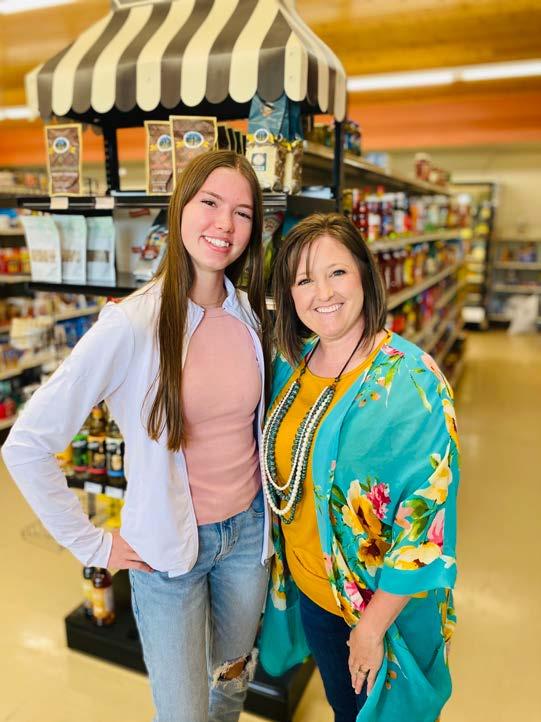
How one rural Nebraska district is serving their community and giving students hands-on learning experiences
If you’re ever driving through Nebraska’s sprawling Sandhills, you’ll come across something very special in the small village of Cody. Just off Highway 20 is a sign inviting you to shop at “Nebraska’s Only Straw Bale Supermarket!” But Circle C Market’s building isn’t the only thing that makes it unique—it’s actually a fully stocked grocery store run by the students of Cody-Kilgore Unified Schools (CKUS). It’s also the only grocery store serving residents of the large rural district. As food insecurity becomes a growing problem nationwide, the story of Circle C Market illustrates how the deep, necessary relationship between a community and its schools can be leveraged to make lasting change.
Cody-Kilgore Unified Schools is a remote district in a massive county. Cherry County, Nebraska, is so large— encompassing nearly 6,000 square miles—that it takes up more land than the entire state of Connecticut. The people of Cody and Kilgore have a deep connection with that land, too. Many of the district’s families have been farming and operating ranches there for generations.
But Cody and Kilgore together have a population of fewer than 250 people—and around 160 of them are students. So living and learning in the area presents a unique set of challenges, especially when it comes to finding jobs and resources. On top of all that, the school district itself serves a whopping 553 square miles of Cherry County, which includes three area codes. That means long commutes for many of the district’s families and staff.
Sadly, the district’s sole grocery store closed in 1995, forcing residents to drive long distances for food and other household goods. “Some of our kids travel over an hour to get here from their ranches,” says Secondary Administrative Assistant Carrie Ford, who helps run the store outside of school hours. “One of the things that parents were always saying was: If I’m going to enroll my kids in Cody-Kilgore, I need to be able to get groceries when we come to town. ” It became clear that CKUS needed a solution—one that would benefit the district and the entire community. And so the Circle C Market was born.
After securing the USDA grant and additional funding from independent organizations, there were still more hoops to jump through before construction could begin. First and foremost, they needed a location. Fortunately, there was an unused plot of land in Cody not far from the high school— but procuring it wouldn’t be so easy. The land was owned by the Nebraska Game and Parks Department. So what did the GRIT Committee do? “The kids had to go five-and-a-half hours to Lincoln to give a presentation pleading their case for the store,” Carrie Ford says. Their efforts were a success, and the students were granted a 99-year lease for the land.
And student involvement didn’t stop there. The GRIT Committee played a part in everything from helping craft the business plan to building the actual store. Because straw is plentiful in the Nebraska Sandhills, the team decided to build the market in the energy-efficient “straw bale” technique, using donated straw for insulation. Students and other community volunteers broke down 1,300-pound straw bales into smaller square bales and placed them within the building’s frame. There’s even a viewing window inside the store where you can get a peek at the straw in its walls.

Circle C Market was the brainchild of Cody-Kilgore teachers
Stacey Adamson and Tracee Ford, who started the planning process in 2008. To kick things off, they assembled a team of student volunteers who dubbed themselves the GRIT Committee—short for “Growing, Revitalizing, Investment, and Teamwork.” These students helped spread enthusiasm around town about a student-operated store—one that would simultaneously serve the community and help teach students business practices and skills. And when the Circle C planning team discovered that a USDA Rural Development grant could help pay for the project, a town board member was so impressed with the idea that they helped write the application.
After a few hiccups, Circle C Market eventually found a supplier willing to travel to the area and stock its shelves. It also formed a partnership with a grocery store in nearby Valentine, Nebraska, to keep fruits and vegetables in stock. And the unique market doesn’t just sell the basics, either. It actually looks much more like a Trader Joe’s than a typical grocery store, with shelves full of thoughtfully curated products and home goods, often chosen by the student workers themselves. “We have a really good selection to help our community out,” says teacher and store manager Liz Ravenscroft. The store even sells locally crafted fruit and wine vinegar made at another of Cody’s straw bale businesses.
Now the 3,500-square-foot market and “entrepreneurial learning laboratory” has been a staple of the CodyKilgore community for a decade, providing residents with a wide selection of food choices and students with unique, hands-on learning experiences.
From the beginning, Circle C Market has been all about the students—and, for the most part, they’re the ones keeping the store up and running. Student workers do everything: ordering products and supplies, managing inventory, stocking shelves, working cash registers, maintaining clean facilities, and even using bookkeeping software. “This teaches them so much more than just working in a grocery store, like how to work with others and how to handle the business side of things,” Ravenscroft says. “The goal is to grow more future business people.”
During the school year, students earn grades for their work, and they get paid hourly for working after school and on weekends. In the summertime, students have the opportunity to be paid for even more hours. “The kids run the store during the summer, too,” Carrie Ford tells us. “We only default to adults if all our kids are absolutely busy.” Some even work as “student managers,” but overall operations are managed by Ravenscroft, who also serves as the district’s business, accounting, and entrepreneurship teacher. “Part of the agreement with the district is that the business teacher is always the manager of the store,” she tells SchoolCEO. “My main classroom is actually at the market, and it’s set up like an official classroom. But there are also work-based learning classes where students come down to the store for an hour at a time and learn various skills.”
Kate, a Cody-Kilgore student who will be a junior in the fall, just began training as an office assistant at the market. She approached Ravenscroft because she wanted to learn the software it takes to run a business. “I’ve always been interested in doing things like Quickbooks for a career, maybe being an accountant,” Kate tells us. “And I live 40 miles away, so I get to come over for sports and then come to work, too.”
The impact on the district’s students is multifaceted—they’re getting the opportunity to work and earn money in a rural area, to have hands-on learning experiences, and to support their community while growing as people. “The store has a good impact on the community, especially the students,” Kate says. “It teaches us a lot of social skills, like how to talk to people and communicate better.”
The market also helps the district in more ways than one. “The big challenge of being in a rural community is getting our kids to come back,” says Ravenscroft. “But ranchers
need their books kept, too. So learning in the store can help students with many different things, even if they want to come back and start their own businesses. We’re always trying to see where we can make this even better and help even more kids.”
Because of this student-centered endeavor, area residents no longer live in a food desert, and they’re also able to support their local schools by shopping at the store. “There’s a lot of community support here that really understands the need on both levels,” Ravenscroft explains. Customers can even round up their purchases to the nearest dollar to contribute to annual scholarships for high school seniors who have worked at the market.
When customers enter Circle C Market, they see big, bold orange letters painted on the far wall that read: “It’s more than a store. It’s our future!” In so many ways, this statement rings true. What started as an idea between two dedicated teachers has become an inspiring reminder that no community is too small for big ideas. No school district is too far out of the way to give its students the opportunity to grow their futures. “Not only is Circle C Market important for the kids,” says Ravenscroft, “it’s important for the community, and for everyone to see what we’re doing here. You’ve got to come visit our store.”
SchoolCEO is a research and perspectives magazine for school superintendents, communications professionals, and other K-12 leaders. Published quarterly in print and online, it is the only magazine focused on marketing in K-12 public education. With more than 20,000 readers, SchoolCEO is leading the conversation on communications, recruitment, and branding in public education.
SchoolCEO was launched in 2018 by Apptegy, an education technology company based in Little Rock, Arkansas. As a burgeoning startup, the company didn’t want to just sell school apps and websites. They wanted to become a true thought leader in the world of school communications and marketing, providing value to clients and non-clients alike.
The result was an independent quarterly magazine full of high-quality journalism and research, all devoted to exploring high-level ideas in school leadership and marketing. The best part? It’s completely free for K-12 school leaders and school communication directors.
Subscribe for free or learn more at schoolceo.com.


Apptegy
Emily Milnamow 2201 Brookwood Dr, Suite 115 Little Rock, AR 72202
Phone: (317) 219-8686 conferenceteam@apptegy.com

Cheever Construction
Doug Klute
3425 N 44th St Lincoln, NE 68504
Phone: (402) 477-6745 dklute@cheeverconstruction.com

CMBA Architects
Troy Keilig
208 N Pine ST, Ste 301 Grand Island, NE 68801
Phone: (308) 384-4444 keilig.t@cmbaarchitects.com

Cornhusker International Trucks
Russ Folts
3131 Cornhusker Hwy Lincoln, NE 68504
Phone: (402) 304-4016 russ.folts@cornhuskerinternational.com

DA Davidson
Paul Grieger
450 Regency Parkway, Suite 400 Omaha, NE 68114
Phone: (402) 392-7984 pgrieger@dadco.com

DLR Group
Emily O’keeffe
6457 Frances St, Suite 200 Omaha, NE 68106
Phone: (402) 393-4100 eokeeffe@dlrgroup.com

Facility Advocates
Dave Raymond 3738 S 149th St, Suite 102 Omaha, NE 68144
Phone: (402) 206-8777 draymond@facilityadvocates.com

MCL Construction
Travis Justice 14558 Portal Circle Omaha, NE 68138
Phone: (402) 339-2221 tkj@mclconstruction.com


Network For Educator Effectiveness (NEE)
Marc Doss
288 Maguire Blvd
Columbia, MO 65211
Phone: (844) 793-4357 dossm@missouri.edu

Piper Sandler & Co
Jay Spearman
11422 Miracle Hills Dr, Suite 408
Omaha, NE 68154
Phone: (402) 599-0307 jay.spearman@psc.com

RMV Construction
Curtis Baetz 1515 E 11th St
Kearney, NE 68847
Phone: (308) 893-2010 curtis@rmvconst.com

Trane Technologies
Jonathan Hoesch 11937 Portal Rd
La Vista, NE 68128
Phone: (402) 499-8468 jonathan.hoesch@trane.com

Tremco Roofing
Tyler Petersen 3735 Green Road
Beachwood, OH 44122
Phone: (909) 302-0617 tpetersen@tremcoinc.com

Voss Lighting
Randy Herrick 4624 S 140th St
Omaha, NE 68137
Phone; (402) 850-9789 randy.herrick@vosslighting.com

Wilkins Architecture, Design, Planning
Jacob Sertich
2204 University Dr, Suite 130
Kearney, NE 68845
Phone: (308) 237-5787 jsertich@wilkinsadp.com














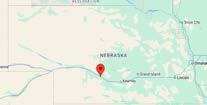
Superintendent: Dr. Dan Endorf

Mascot: Haymakers
Enrollment: 950
Location(s): Pre-K - 5 building and 6 - 12 building in Cozad, NE
Interesting Fact: Cozad is the boyhood home of Robert Henri. Henri was originally born Robert Cozad and became a famous American artist known for both his use of color and his fluid and original draughtsmanship.
Principals: Corey Fisher (9-12), Brian Regelin (6-8), Justin Dowdy (PK-5)
Board of Education: Ann Burkholder, Joel Carlson, Will Geiger, Kiley Goff, John Peden, Michele Starman

Community Support: The district passed a $26 million dollar bond issue in 2022 and will soon complete the accompanying construction project
Fine Arts: Cozad High School is a consistently high performer and fourtime state play production champion


Mascots: Cougars
Enrollment: 366

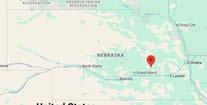
Location(s): Stromsburg & Benedict NE
Interesting Fact:We are located in the country surrounded by cornfields.
Superintendent: Brent Hollinger

Principals: Elementary Principal- Ken Booth
HS/MS Principal- Justin DeWitt

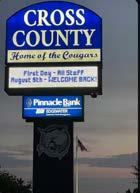

Board of Education: Kurt Moore, Marla Teegerstrom, Quinn Peterson, Jason Fellows, Cindy Nyberg and Aaron Phillips
Cross County Schools participates in the VEX Robotics Program. Each year, a new game is announced and teams must build robots that best accommodate the game. Teams also keep an engineering notebook where they document their building process. This year, the game is High Stakes. In this game, points are scored by placing rings on poles which count for one point each. However, there are mobile goals that can be placed in a corner. Two corners double the score of the goal, and two subtract it. There are three main components of competition. In competition, teams of two are placed on the field and compete to get the most points in a match. In skills, a team plays by themselves to try to score as much as they can within a one minute time limit. In judging, judges decide who will get special awards based on the engineering notebook and in-person interview. This year, there are four VEX teams participating with seven people between the teams. The robotics program has seen a lot of success in the recent years at Cross County, having at least one team make worlds each of the last four years. So far this year, there is one team that is qualified for state in Omaha North this March. Our Robotics team is lead this year by Mr. Andrew Steskal.

Our FCCLA program continues to thrive under the direction of Mrs. Sarah Hubel. We have a large group of students participating every year, with many of them presenting in Local, State, and National competitions! We had a group of three students travel to Seattle, Washington in July of 2024 – Paxton Burke, Korah Hier, and Julia Stewart, to demonstrate cougar excellence at the 2024 National FCCLA Leadership Conference through Challenge Tests competitions. Congratulations Korah on placing 3 in the Early Childhood Challenge and Paxton for placing 3rd in Consumer Math and 1st in Nutrition Challenges! Last year was the third year in a row being recognized as a gold chapter. Our officer team does an awesome job planning a comprehensive program of work that includes member recognition, competitive events, public relations, and community.
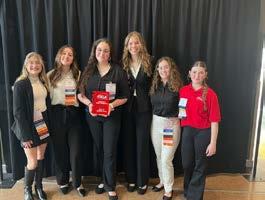
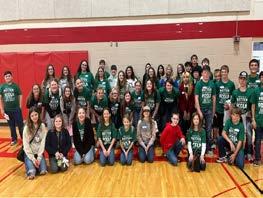


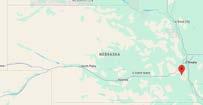
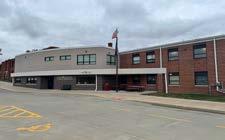
Mascot: Indians
Enrollment: 281 students
Location(s): Weeping Water, NE
Interestign Fact: Weeping Water Public Schools is dedicated to fostering a cradle-to-career educational experience, ensuring students are supported from infancy through their professional journeys. The district boasts an on-site childcare facility, partially funded by Sixpence, serving children from 6 weeks old to Pre-K, providing a strong foundation for early learning. This commitment to comprehensive education continues with the recent addition of the Jobs for America’s Graduates (JAG) program at the middle and high school levels. Students engage with local employers, such as medical pathfinders through Syracuse Area Health and the region’s limestone quarries, gaining valuable career exposure and practical skills that prepare them for future success.
Superintendent:
Principal(s): Amy
Director of school improvement
SPED/Secondary

Board
FFA. Since its founding in 2022, Weeping Water High School’s FFA program has quickly become a hub of leadership and innovation, blending agricultural education with practical experience. Notably, the chapter launched Limestone Coffee, a student-run business that teaches real-world skills in entrepreneurship and management. Beyond business success, the FFA chapter has excelled in district and state competitions, highlighted by reaching the finals of the state parliamentary procedure competition in 2023. Through hands-on projects, leadership training, and community involvement, the program has shaped students into future leaders equipped for both academic and professional success, setting a high standard for agricultural education at the school.
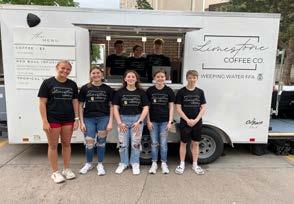
Circle of Friends. The elementary school has launched a program named Circle of Friends to address the growing mental health challenges faced by students. In response, the district has dedicated lessons focused on social, emotional, and behavioral learning. By organizing students into multigrade level groups, the program offers tailored lessons aimed at meeting the specific needs of each group. These sessions occur every Wednesday for the last thirty minutes of the school day. Additionally, the district has expanded this initiative to middle and high schools through Positive Action lessons, ensuring that the social-emotional learning (SEL) needs of all students are being addressed. This comprehensive approach aims to foster a supportive educational environment where students can better navigate their mental health challenges and develop essential social and emotional skills.
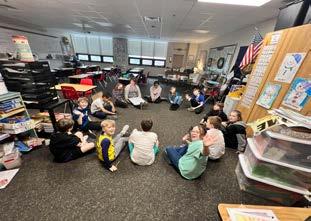
We have a new tuition discount program aimed at better serving folks from rural districts who are seeking school leadership degrees (MEd – principalship, EdD – superintendency) or endorsements. The program provides a 15% tuition discount for educators who serve in NRCSA member districts or are in an area classified by NCES as rural or town. We think this is a small but important step toward helping rural schools be intentional about growing their own leaders. If interested, please contact Dr. Nick Pace at nick.pace@ unl.edu
Big Red Leadership Flyer
In addition, invite your participation in a federal grant application aimed at helping Nebraska school districts. Led by the UNL Department of Educational Administration, the GrowthOriented Leadership Development (GOLD) Project is a collaboration across NCSA, NRCSA, ESUCC, and NDE. Goals include:
• Developing current and future leaders in a growyour-own model
• Strengthening School Leadership
• Improving Principal and Teacher Retention
GOLD Highlights:
• A focus on local, building/district level context, not a top-down, one-size-fits-all approach
• Research-based content aligned with Marzano’s Balanced Leadership and other recent work
• Use of existing professional development structures led by credible leaders and coaches
• No additional costs or duties to ESUs or districts
GOLD Includes:
• Regular, large group professional development for the principal and 2-3 teacher leaders per building
• Small group coaching and facilitation provided by grant-funded coaches
• Application of material presented in sessions to local school improvement priorities and integration with the new NDE Nebraska Teacher and Principal Professional Standards (NTPPS)
• A stipend to participating schools to support implementation of GOLD dimensions and materials
To Learn More: https://cehs.unl.edu/edad/gold-project/
Chadron State College Special Education Parato-Teacher Program Initiative.
Purpose: This “Grow Your Own” Special Education Teacher program is designed to provide school districts with the opportunity to cultivate and participate in the training of their para-professionals who wish to continue their education to become special education teachers.
Who: Any individual who holds a minimum of an Associate’s Degree (or equivalent credit hours) from an accredited higher education institution, and who is employed as a para-professional within a school district. What: Chadron State will provide required course work and enrichment activities via online, face-to-face (via Zoom), and on the job experiential learning, leading to a Bachelor’s in Education Degree, and a Nebraska Teaching Certificate with an endorsement in Special Education (grades PK-12). With administrator input, program course work will be tailored to best fit your district practices and expectations. Each course will be offered in an 8-week format, with 12-13 credit hours to be completed each 16 week semester. How: Program participants will be advised, monitored, and supported by CSC faculty/staff, and a CSC Education Program liaison is specifically assigned to facilitate their progress. District para-professionals may enter the program at any time in the academic year.
When: once participants reach their senior academic year they will embark on completing their capstone course work, via online and Zoom class sessions. This course work has been pared down considerably with the understanding and assumption that these student teachers will be learning “on-the-job”. For example, one section covers classroom management practices. Clearly, one can argue and attest that these student teacher interns are learning more about managing a classroom from being mentored by veteran teachers within your school, and observing them in action. This is the belief and learning approach embraced during this senior year. However, to ensure and assess concept learning, Chadron State faculty will be meeting with your student teacher cohort twice per week for 1.5 hours, via Zoom conferencing technology.
Graduation: At the completion of this program students/candidates graduate from Chadron State College, and apply for teaching licensure resulting in a valid initial teaching certificate with and endorsement
in PK-12 Special Education. Chadron State’s education program in nationally and State accredited. As such, interstate certification reciprocity is not a problem.
1) To qualify for this program participants must hold at least an Associate’s Degree or the equivalent in college credit hours. (CSC will work with those applicants to provide them with the needed coursework leading up to program entry).
2) Districts must agree to maintain para-professional employment throughout the course of the program— including during the student teaching experience.
Please contact Dr. Adam Fette for more program information, at afette@csc.edu.
The UNL Department of Educational Psychology has received a grant from the Swanson Foundation which allows them to offer mental health services to rural schools.
From Dr. Michael Scheel, Chair of the UNL Department of Educational Psychology:
The UNL Department of Educational Psychology would like to offer counseling and psychological services, as well as consultation services to the schools and communities of Southeast Nebraska. We run a mental health counseling and therapy clinic and we are offering counseling and consultation services to teachers, administrators, students, and community members of Southeast Nebraska. Services will be provided through remote and confidential means (i.e., Zoom conferencing). We are hoping that schools, families, and individuals contact us to schedule an appointment for a telehealth counseling or consultation session.
We have recently learned that a donor will support our work with individuals living in rural Southeast NE by paying all fees for services. Thus, whoever seeks out our services will simply have to indicate they live in Southeast Nebraska, and any services we provide will be paid for through the UNL Foundation. Individual, couple, and family counseling will be provided without financial expense. Additionally, we can provide teachers, school administrators, school counselors, and school social workers consultation services for students of their schools without charge.
We are very excited to enter a partnership with schools and communities of SE Nebraska to promote mental health and well-being. We are aware of the mental health counseling disparities that exist in Nebraska rural areas, and our department, our College of Education and Human Sciences, and UNL are highly interested in offering our expertise and resources with the goal of enhancing the well-being of SE Nebraska individuals, schools, and communities. We are a group comprised of licensed psychologists and psychology graduate students who regularly provide services through our clinic to the Lincoln community. We are seeking to reach beyond Lincoln to connect more with surrounding rural areas. We also are acutely aware of the importance of addressing mental health concerns right now as we all are experiencing the stress of going through the COVID-19 pandemic.
The Counseling and School Psychology Clinic is a training clinic in which graduate students in counseling and school psychology work with clients under the supervision of licensed psychologists. Services are available to all on a sliding scale. For clients from SE Nebraska communities, services will be paid for through UNL Foundation funds supplied by a donor who cares deeply about the welfare of schools and communities in SE Nebraska. Counseling services are offered to improve well-being, improve academic and behavioral issues, stabilize mood, manage stress, and improve life-adjustment issues.
For more information, please visit our clinic website: https://cehs.unl.edu/edpsych/clinic/
A common theme from some of the decision makers on the state level is that “out of control” local spending is to blame for the property tax problem. NRCSA, along with many other educational entities, maintains that we do not have a school spending issue, but instead have a school funding issue. Attached are two reports, one from NRCSA, the other from Open Sky, that discuss the myth of “out of control” school spending. It is my hope that administrators and Board of Education members will read, then use these reports to counter those claims. When you do please tell your district’s story as that is the most powerful way to get this message across.
NRCSA Spending Study
A Look at School Spending in NE from Open Sky
Jack Moles, Executive Director (402) 335-7732
jmoles@nrcsa.net
Jeff Bundy, Office Manager (402) 202-6028
jbundy@nrcsa.net
Legislative Contacts
U.S. Senators
Deb Fischer
Pete Ricketts
U.S. House of Representatives
Don Bacon
Mike Flood
Adrian Smith
Nebraska Governor
Jim Pillen
NE State Senators
Raymond Aguilar, Dist 35
Joni Albrecht, Dist 17
John Arch, Dist 14
Christy Armendariz, Dist 18
Beau Ballard, Dist 21
Carol Blood, Dist 3
Carolyn Bosn, Dist 25
Eliot Bostar, Dist 29
Bruce Bostelman, Dist 23
Tom Brandt, Dist 32
Tom Brewer, Dist 43
John Cavanaugh, Dist 9
Machaela Cavanaugh, Dist 6
Robert Clements, Dist 2
Danielle Conrad, Dist 46
Jen Day, Dist 49
Wendy DeBoer, Dist 10
Barry DeKay, Dist 40
Myron Dorn, Dist 30
Robert Dover, Dist 19
George Dugan, Dist 26
Steve Erdman , Dist 47
John Fredrickson, Dist 20
Steve Halloran , Dist 33
Ben Hansen, Dist 16
Brian Hardin, Dist 48
Rick Holdcroft, Dist 36
Jana Hughes, Dist 24
Megan Hunt, Dist 8
Teresa Ibach, Dist 44
Mike Jacobson, Dist 42
Kathleen Kauth, Dist 31
Lou Ann Linehan, Dist 39
Loren Lippincott, Dist 34
John Lowe Sr. , Dist 37
Mike McDonnell, Dist 5
Terrell McKinney, Dist 5
Fred Meyer, Dist 41
Mike Moser, Dist 22
Dave Murman, Dist 38
Jane Raybould, Dist 28
Merv, Riepe, Dist 12
Rita Sanders, Dist 45
Julie Slama, Dist 1
Tony Vargas, Dist 7
Brad Von Gillern, Dist 4
Lynne Walz, Dist 15
Justin Wayne, Dist 13
Anna Wishart , Dist 27

New Leaf Teletherapy
Planning Support Service
Scholarship and Awards Programs
Superintendent Search Service
USBank OneCard Program
